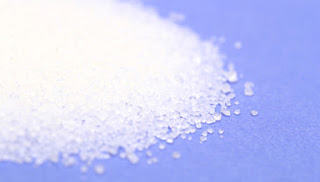What is Xylitol?
My first encounter with xylitol is in my "dental cavity" class at University of Michigan, I still remember the school dental store being our only xylitol supplier. 10 years later, this sweetener is finally starting to get its fame in the United States. Xylitol is basically a sugar alcohol derived from mostly trees but can be found in some plants and fruits as well. Here is what it looks like:
 |
| Xylitol Crystals |
It looks just like sugar crystals, doesn't it? How is it different from sugar? Here is how:
- It has 2.4 calories/gram vs. table sugar's 4 calories/gram.
- Even though xylitol is a technically carbohydrate, it does not raise blood sugar level. For that reason, it is not net carb hence a popular sweetener among low carb products.
- Its low glycemic index (12) also makes it a great sugar substitute for patients suffering from diabetes and metabolic syndromes.
How is xylitol good for our teeth?
The primary culprit of cavities is a particular kind of bacteria called S. Mutans. It consumes sucrose (table sugar) and produces acid that causes our teeth to break down. Because of the similar chemical structure of xylitol to sugar, it can be picked up but not digested by S. Mutans. The bottom line is, xylitol can starve the harmful bacteria in the mouth, reducing plaque buildup and tooth decay. This can help prevent dental caries and inflammatory gum diseases.
For people who are interested in the scientific process of xylitol's anti-cavity function, here is a simplified list:
- A molecule (tridentate ligand) in xylitol can rearrange with calcium and allows it to be transported through saliva and remineralize the outer layer of our teeth (enamel) before dental cavities form. Basically, it prevents teeth from becoming "soft."
- S. Mutans cannot digest xylitol, so once they pick up xylitol their sugar metabolism is blocked. Without proper energy being released from the process, it eventually dies from "starvation." No bacteria, no cavities.
- Reduction of stomach acid normally created by sugar will decrease the degradation of enamel from erosion.
Where to get it?
Xylitol can be found in chewing gum, candies, and numerous dental products. Here are some I have been recommending to my patients:
- Chewing gums - Mentos Pure Fresh, Xlear Spry Gum, Glee Gum,
- Candy and sugar substitutes - Dr. John's Candies, Xylosweet by Xlear
- Toothpaste - Tom's of Maine, Xlear Spry
- Mouthwash - Tom's of Maine, Xlear Spry
I have tried most of them. Dr John's have been particularly adept with convincing my smaller patients to be brave in the chair and their caramel and chocolate have rescued me from my own sweet cravings more than I would like to admit! I haven't had a chance to experiment with a xylitol recipe on my baking weekends, but hope to do so in the future. Leave me a comment if you have tried baking with any sugar substitute.
Xylitol is becoming increasingly accessible in these last few years and is likely to grow more and more in everyday use. There might be a day soon enough where cavities are no longer the infectious disease that is all too common and xylitol might just prove to be the tip of the iceberg that ends it.
Mentos Pure Fresh
Xlear Xylitol Products - Spry and Xylosweet
Tom's of Maine toothpaste
Dr. John'sThoughtfully Crafted Sweets
Xylitol is becoming increasingly accessible in these last few years and is likely to grow more and more in everyday use. There might be a day soon enough where cavities are no longer the infectious disease that is all too common and xylitol might just prove to be the tip of the iceberg that ends it.
Mentos Pure Fresh
Xlear Xylitol Products - Spry and Xylosweet
Tom's of Maine toothpaste
Dr. John'sThoughtfully Crafted Sweets
No comments:
Post a Comment